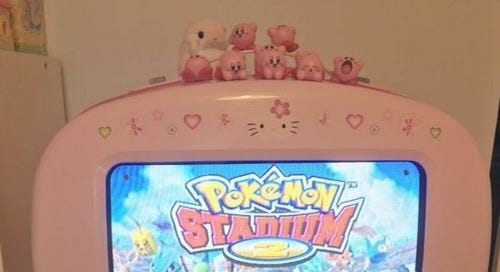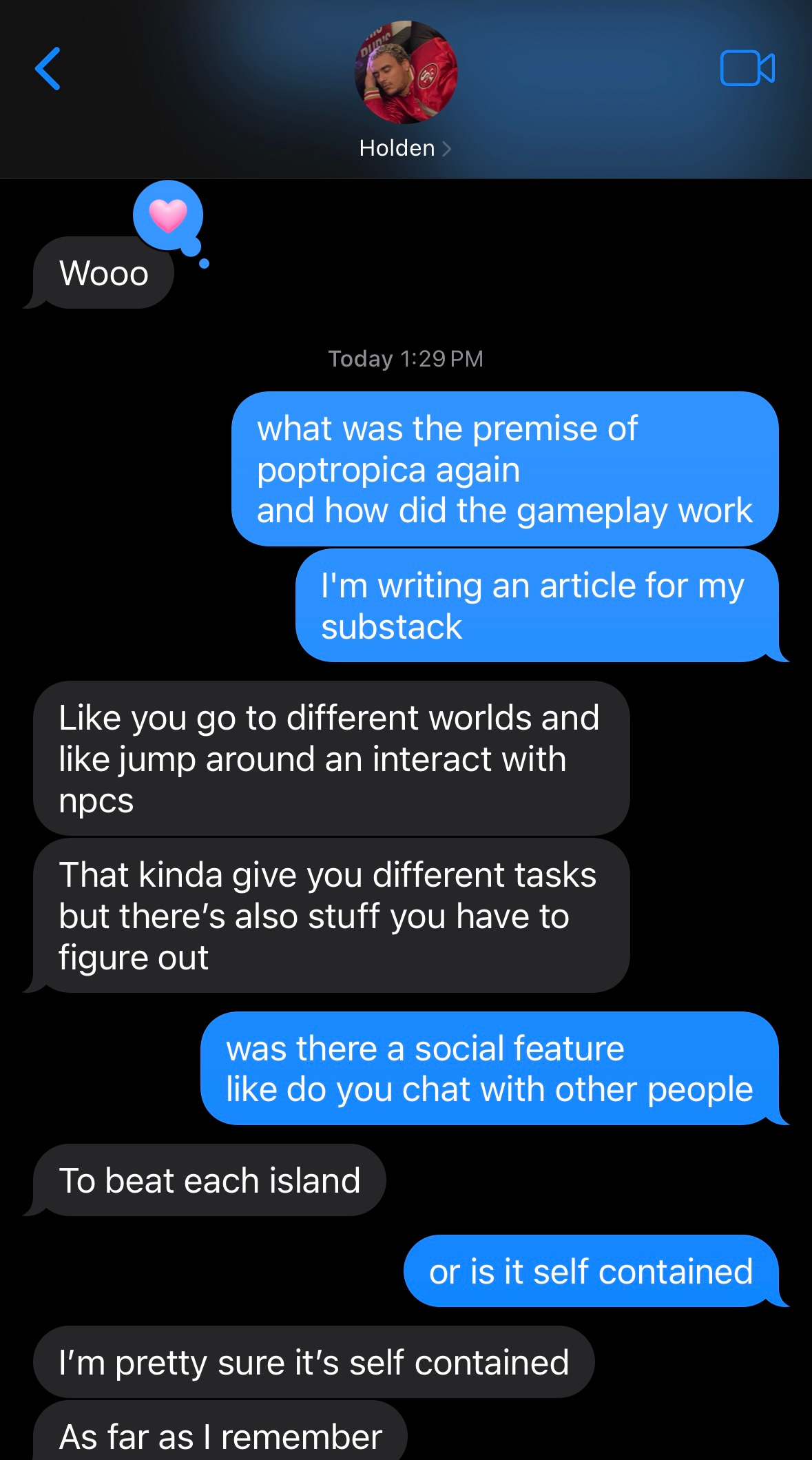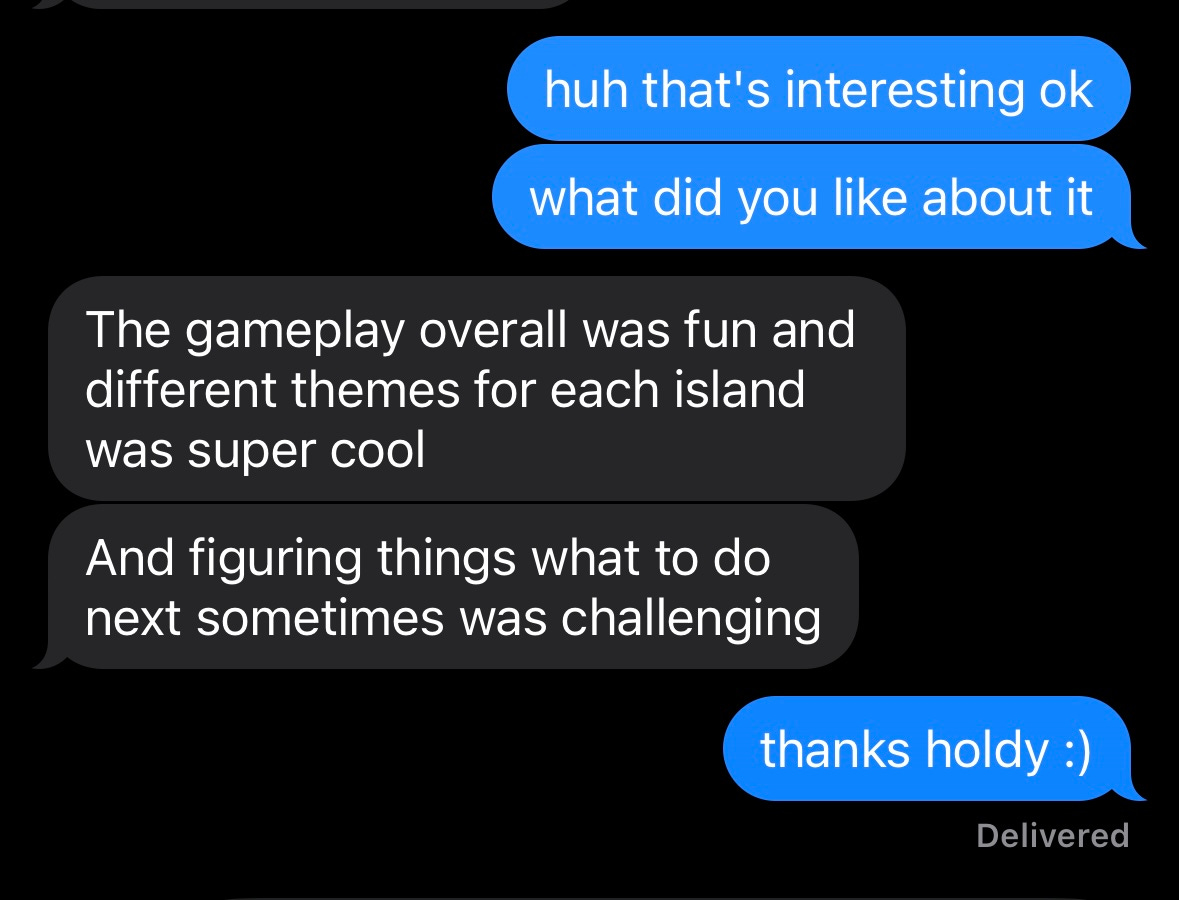We Used To Be Weirder
Or, how making the Internet bigger, faster, and sleeker didn't make it better
Everyone thinks their childhood was the best time to be a child. Everyone thinks their childhood was the worst time to be a child.
I spent high school and college firmly planted in the 2010s, making my childhood the 2000s. People still bought CDs (until they didn’t). No one was talking about body positivity and everyone was buying that Jamie Lee Curtis laxative yogurt. You might have been lucky enough to have a computer in your room, but many were relegated to The Family Computer in some central part of the house. And no matter where the computer was located, you were spending hours combing the web for Websites.
Capital W Websites are no longer de rigueur. There is social media. There is online shopping. There is news and there is porn and there is email. But when I first connected to the internet, there was something else. Something weirder, uglier, dumber, and more confusing. And all of it was incredible.
Recently I had a challenging personal experience. I don’t feel like going into detail, but my brothers and I needed a reprieve from the anxiety and seriousness. I don’t know what my older brother did—he’s 30 and an Ivy League-educated marathon runner, the kind of person who has never had any interest in Websites—but my little brother and I (quirky artist types who are about as Type B as a family of overachievers can get) decided to regress. We returned to one of our favorite websites to suit this end: Toontown.
Toontown is a child-friendly MMORPG launched in 2003. Its premise is simple: you are a cartoon animal living in a colorful cartoon world. All you want to do is crack wise with your friends and go fishing. But there’s a problem. Capitalist robots called Cogs keep flying into your ‘hood and gentrifying it. The only way to get rid of them is to pull increasingly hilarious pranks on them until they explode. The Cogs fight back, so if they ask you to circle back on email too many times, you will die. (You will not literally die. You will “get sad” and then have to get happy again to go back to dropping anvils.) You start off with 15 health points and two incredibly weak weapons (called gags), and over time, you accumulate better weapons, as well as a greater capacity to withstand the boredom of Cogs and their attendant corporate jargon. The graphics are bad. The gameplay is repetitive. The puns are unbearable. It is a truly incredible game.
I didn’t play much Toontown during its first iteration—the official game was taken down in 2013, only to be immediately reuploaded on fan servers as Toontown Rewritten, which is what Holden and I are playing now—because I was too busy watching our eldest brother play it. (If you’re not the oldest among your siblings, you remember the hallowed religious sacrament of Watching The Oldest Play And Not Getting A Turn). Playing it now is remarkable, mainly in that nothing takes as long as I remember it taking. Part of this is the reupload of the game running slightly differently. Part of this is getting older. An hour used to feel like forever. Twenty dollars used to feel like a lot of money.
Club Penguin has an even more ridiculous premise than Toontown. The premise is this: you are a penguin. That’s it. That’s the game. You own a house (igloo) over which you have vanishingly little interior design control, and you can get a pet (puffle) that can’t really do anything and is not a real animal. There are mini-games—an infuriating pizza-making game where you have to follow pizza decorating instructions on a conveyor belt that eventually goes WAY TOO FAST, and then there was something involving karate, I think—and by far the most seductive feature was the option to become a secret agent, completing missions by visiting various locations around the island and collecting items for digital swag (it’s been over a decade and I’m not researching this essay, so I could be misremembering). The primary feature of Club Penguin, at least to me when I was eleven, was the ability to stand around in various rooms, waiting for your friends to join so you could use the Website essentially as a low-tech VR chat room. I vividly remember sitting at lunch in sixth grade, planning with my friends about which server we would join at which time, so we could all get online and…do the same thing we were doing on AIM, which was talk about nothing of substance. It’s AIM and it’s the same but we’re penguins so it’s not.
I have not played any of the fan-made Club Penguin offshoots since logging off for the last time 15ish years ago, but I did watch a couple of YouTube videos about the site’s downfall. Apparently the vacuum created by the site’s collapse created a Penguin Chat Room Mafia of sorts, wherein multiple “organizations” (term used very loosely) attempted to recreate the original game and court as many of the original users as possible. This led, inevitably, to a sex abuse scandal; one of the site owners began soliciting nude photos from underage girls in exchange for moderator privileges. The YouTube comments asked, repeatedly, why so often people obtain power and then immediately try to use it to obtain nude photos of underage girls. It is an important question, and not one I have any authority to answer.
It’s worth noting that when I was a child, internet safety from child predators was a constant topic of conversation. I still remember when you weren’t supposed to put photos of yourself, or your name, or your age, or the city you lived in, or any identifying information online (remember those days?). I imagine that many parents still have these rules in place for their own children, but there are obviously millions of minors on Instagram and TikTok who not only constantly post their name and likeness, but earn millions of dollars for doing so. I watched To Catch A Predator like it would endow me with some kind of protective amulet against older men online. Now it seems like those conversations have drifted to the fringes. The danger was real, but there was something almost whimsical about the warnings not to get groomed on Club Penguin, or Neopets, or whatever other Website you used to pass the time. At the end of the day, those sites were games, connected to nothing, with no stake or significance when you turned the computer off. They had no photos of you. Finding your location would require a devotion and technical skill level that few people bothered to muster. It feels far more grave that children are pursued by predators on Instagram, owned by Meta, which owns everything, sees everything, knows everything.Holden played something called Poptropica. I didn’t play it much, so I did research (texted him asking what it was) and this is what he told me:
My memory was jogged: I have a vague recollection of watching him (in a rare table-turning of Older Sibling Watching Younger Sibling Play The Game) solve puzzles and bounce around from island to island as he did so. The animation style of the game was particularly bizarre; both Toontown and Club Penguin involved animal avatars, while the Poptropica avatars were supposed to be people, or at least humanlike facsimiles. The only other Website I visited where the players were humanoid was Millsberry, which I just googled and found out is something called an “advergame.” When I was putting digital me in little outfits, I had no idea I was shilling for General Mills. To me, this is a perfect example of what a Website used to be. In 2004, companies sold you cereal by convincing you to make a digital avatar whom you can dress in little outfits, and…that’s basically it. In 2024, companies sell you cereal by buying your data and being kind of bitchy on Twitter.
Millsberry was mostly a low-tech lifesim with mini-games. Poptropica, therefore, aligned more with Toontown—while you couldn’t play alongside anyone, you were working in service of some larger goal, some storyline to finish or loot to acquire. Because of the puzzle-solving aspect, I remember there being guides online with shortcuts and walkthroughs to help you beat islands faster. I recognize that lifesims and MMORPGs and other games still exist; what has shifted is their location. Gaming is not part of the Internet now—games are no longer run on weird little Websites. There are Reddit message boards and YouTube channels devoted to video games—in case you missed the chorus of “Massachusetts,” I’m more than familiar with the subculture—but the games themselves feel siloed. There are clearer graphics and stronger narratives. The games are better. But it feels like the loss of the stupid bad Websites has made the Internet worse.
The Internet is social media now. When people talk about losing hours to their phones or their computers, they’re not talking about porn or news or email. (Unless they are, in which case, are you guys okay?) Logos keep getting cleaner. Colors are getting calmer. Fonts are losing their serifs. Everything is losing its character. Every website with even the potential to become a Website is sanded down and turned into everything else before it has the chance to blossom. Everything is a photo-sharing app. Everything is a video-sharing app. Everything is Twitter. We should all know less about each other.
It isn’t just the internet. It’s the whole world. We are being assaulted with more trauma and misinformation and pain than any human beings in recorded history, and we are being distracted by clean lines and soft neutrals. We turned our auto-caps off and never looked back. There are no Websites anymore, only websites. Nothing is ugly. Everything is beige.
I don’t have much time left as a truly Young Person. I almost wrote “as a kid,” and then realized how juvenile it sounded. I’m not going to be old any time soon, but I won’t be really truly young for much longer. I’m not a kid. I’m 27. I am in my Late Twenties. When I walk by myself in reflective surfaces, I see a woman. I find 40-year-old men more attractive than 20-year-old men. I call the people I’m dating “men” instead of “boys.” When people my age get engaged or pregnant, I don’t panic. I go to the dentist and get my car serviced and call repairmen without asking my parents to call for me. I feel responsible for the people I care about. People rely on me; sometimes I am a rock. The time for Websites has long since passed. I’m playing Toontown to cope.







Falling back into those old nostalgia holes (or what remains of them) is so nice. They’re cold, lonely, and a little isolated and weird, but they feel like home. And when we live in a world increasingly hostile to the idea of humanity and existence, even a vague facsimile of home feels worth pursuing.
(Also: I have vague memories of playing a Kellogg’s-inspired online game growing up that I loved. I’ve never found it again, but I’m sure it’s out there somewhere. I also cared 0% that it was made by a cereal company to sell me stuff, which… what a treat, tbh.)
wow obsessed. i never played toontown but was massively into poptropica, and thought that i would describe it as "club penguin but you're constantly in-mission," but i guess that's not helpful if club penguin is a better comp. also why power coincides with pedophilia is equally confusing to me, we gotta fix that